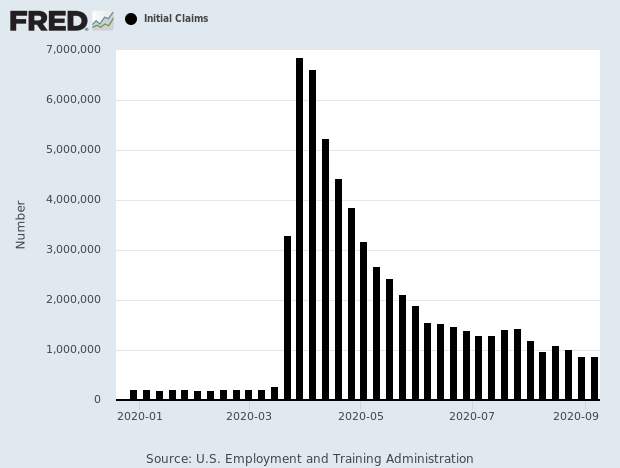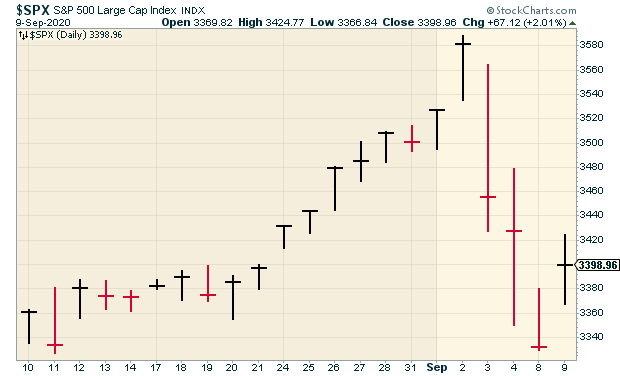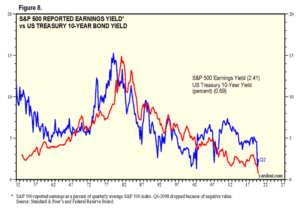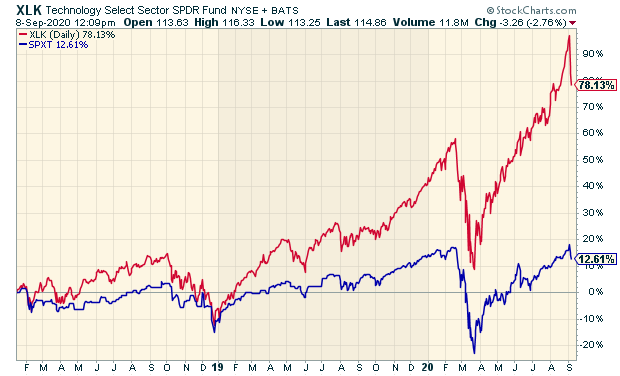Archive for September, 2020
-
Jobless Claims Unchanged
Eddy Elfenbein, September 10th, 2020 at 10:21 amThis morning’s initial claims report came in at 884,000. That was above Wall Street’s estimate of 850,000. Remarkably, that’s the exact same number as last week’s report, after it was revised. The good news is that these are the lowest reports since the crisis started six months ago.
We’re actually not far from the worst jobless-claims reports of the Great Recession. In early 2009, the reports peaked at 665,000. In 1982, jobless claims got to 695,000.
The four-week moving average for claims through the week of Sept. 5, a number which helps smooth out volatility in weekly numbers, declined 21,750 to 970,750. The moving average for continuing claims fell 523,750 to 13.982 million.
Claims under the Pandemic Unemployment Assistance program continued to climb, rising more than 90,000 last week to 838,916. The total of those claiming benefits through all programs, though Aug. 22, also rose to just over 29.6 million.
At the state level, California showed the biggest increase at 17,953 while Florida reported a decline in claims of 9,049, according to unadjusted numbers.
Continuing claims are now at 13.385 million. That’s after peaking at close to 25 million in May. This week’s continuing claims report is slightly higher than last week’s. The Labor Department said that it changed the way it does seasonal adjustments, so the numbers aren’t precisely comparable.

-
Morning News: September 10, 2020
Eddy Elfenbein, September 10th, 2020 at 7:08 amSurging Euro Presents E.C.B. With a Dilemma
WTO Leadership Race Seen as Hostage to U.S. Election
London Offices Aren’t Refilling Fast Enough for Shops Relying on Them
Manhattan Apartment Listings Soar, Pushing Vacancies to a Record
More Americans Are Quitting Their Jobs. That’s a Good Sign
Wall Street Sees A Bright Side In ‘Healthy’ Tech Selloff
Do Jobless Benefits Deter Workers? Some Employers Say Yes. Studies Don’t.
The Other 99.47% Need to Get Back to Work, School and Life
When ‘Buy American’ and Common Sense Collide
India Billionaire to Offer $20 Billion Stake in Retail Arm to Amazon
Amazon Is Hiring 33,000 New Employees With An Average Compensation Package Worth $150,000
TikTok’s Owner Reportedly In Talks With US to Avoid A Sale of the App
J.C. Penney’s Landlords Strike Deal to Rescue It From Bankruptcy
Ben Carlson: Can the 60/40 Portfolio Still Work?
Michael Batnick: Animal Spirits: Democracy Has Failed
Be sure to follow me on Twitter.
-
Growth Inches Back
Eddy Elfenbein, September 9th, 2020 at 4:31 pm
The market had a nice rebound today. This was a reaction to what we had seen over the previous three days. In other words, Tech was up strongly while Value lagged. By no means does this suggest the rotation to Value is dead. The S&P 500 gained back 29% of what it lost over the three-day skid.
Today wasn’t the extreme growth tilt that I expected. To be sure, Tech was up the most but areas like Healthcare and Staples put in respectable gains today.
Our Buy List gained 1.88% today compared with 2.01% for the S&P 500. That’s not bad for a Tech-led day. Compare that with late August when we had several days where we trailed by 50 or 70 basis points.
Shares of Tiffany lost 6.4% today.
-
The Tiffany Deal Is Off
Eddy Elfenbein, September 9th, 2020 at 11:16 amGrowth is having a nice rebound this morning which is to be expected following yesterday’s rout. The question is whether this is the start of a long-term rotation or whether it is yet another head fake. We just don’t know yet.
Growth is beating Value today, but Low Vol is well ahead of High Beta. You don’t see that every day. As I write this, the S&P 500 is up by 1.8%.
One interesting story this morning. LVMH has decided to scrap its $16.2 billion deal to buy out Tiffany. So what went wrong?
Tiffany asked to push the deadline back a few weeks. The French government also asked for a delay because of the threat of American tariffs on French-made goods.
There’s also the angle that the deal was agreed to before the coronavirus hit but it was to be closed during the pandemic. Actually, I’m surprised more deals like this haven’t fallen apart.
It’s an odd take but the deal wound up in the center of a trade dispute between France and the U.S. The Trump administration had actually rolled back its original plans to tax a wide range of French goods including wine and cheese.
The Trump administration threatened these tariffs because, they claimed, that France’s new digital tax unfairly targeted U.S. firms.
They have a point, but the solution may not be the best idea. The French law slaps a 3% tax on revenue that tech companies get from France. The U.S. position is that the law conveniently dings U.S. firms but doesn’t hit areas where French companies are dominant.
That’s clearly true. The French authorities even referred to the tax as the GAFA Tax for Google, Amazon, Facebook and Apple.
The French have said they’re willing to repeal the tax if there’s a broader strategy to tax tech companies across economically-developed countries (OECD, Organization for Economic Cooperation and Development). In fact, Macron even said that if American firms wind up paying more taxes now under the French law than they would under a later agreement, then France would chip in to make up the difference.
For the most part, tech companies and members of Congress support the administration’s policy. The French position is that an American tariff on France is unfair because the U.S. is the one holding up an agreement on taxing tech companies.
The problem is that the U.S. is so dominant in tech that any tax will disproportionally hurt us. Hopefully, the OECD will come up with a plan to tax these companies. I don’t see how anyone is helped by countries going it alone and risking a trade war.
-
Morning News: September 9, 2020
Eddy Elfenbein, September 9th, 2020 at 7:00 amU.S. Businesses in China Not Heeding Trump’s Call to Return Home
Jerome Powell Channels Alan Greenspan in Putting Stamp on Fed
The Fed Enabled a Record Expansion. Trump Is Taking Credit.
The Largest Mortgage Origination Volume on Record
U.S. Regulator Calls Climate Change A Systemic Risk
Saudi Arabia Just Crushed U.S. Crude Oil Prices Again
Natural Gas Is the Rich World’s New Coal
Pandemic E-Commerce Surge Spurs Race For ‘Tesla-Like’ Electric Delivery Vans
$16 Billion Tiffany Deal Collapses Over Tariffs
Trapped by Pandemic, Ships’ Crews Fight Exhaustion and Despair
‘Mulan,’ Once a Sure Thing, Becomes a Problem for Disney
Nick Maggiulli: What Your Psychology Says About Your Relationship with Money
Michael Batnick: Will Money Printing Cause Inflation?
Joshua Brown: Tesla Snubbed (!) and the Nasdaq Whale Story
Be sure to follow me on Twitter.
-
Whither the P/E?
Eddy Elfenbein, September 8th, 2020 at 11:54 amWhy is the P/E Ratio so darned high? That’s a question that’s bedeviled analysts for many years, not just now.
As a stock-picker, I generally avoid such arguments. The stock market doesn’t need to “make sense.” The market gods have their reasons for doing whatever it is they do, even if it’s not entirely clear to us mortals. The judgments of the markets are true and righteous altogether.
The market’s sanity has especially been called into question lately because the market has done well even though the economy has not. The disconnect between Wall Street and Main Street has become a popular talking point.
As I’ve noted before, this disconnect should not alarm anyone. The stock market and economy have little reason to be strongly linked in the near term. We’ve experienced many such disconnects. One popular idea is that President Trump and, of course, “his cronies” are propping up the market for the election. I’m curious where this cabal was during February and March.
In any event, Alan Reynolds, a senior fellow at the Cato Institute, is the latest to take on this question. I should add that since Dow 36,000, conservative pundits have not had a particularly stellar track record in discussing market valuations. (By the way, here’s a brilliant critique of Dow 36,000 written by, as it turns out, me.)
Reynolds writes:
The argument for stocks being greatly “overvalued” rests on the fact that the trailing P/E ratio rose significantly from May 1 to September 1. On January 1, the P/E ratio was 24.21 –about the same as two years before (24.87). Even after Covid-19 and lockdowns crushed the economy, the P/E ratio was still 23.74 on April 1. Stock prices and earnings had both collapsed in sync. The P/E ratio was 25.10 on May 1 after the Fed funds rate fell to nil and the $1,200 checks and PPP loans peaked. It then rose to 26.69 on June 1, 27.57 on July 1, 28.31 on August 1 and 30.32 on September 1.
First, Reynolds points out that the inverse of the P/E Ratio, earnings over price, should generally follow bond yields. As bond yields have plunged, valuation should rise. Since the days of Alan Greenspan, this has often been called the Fed Model, though Reynolds believes he may have originally influenced the Maestro. They worked together on Reagan’s transition team.
Here’s a chart from Reynolds’s post:

Yes, they certainly do seem to match up. Reynolds also notes that the P/E Ratio falls when inflation rises. Therefore, he claims that Jerome Powell’s Jackson Hole speech, which outlined the Fed’s greater tolerance for inflation, could have been a negative for share prices.
While Reynolds says the lower bond yields justify the higher equity valuations, he says the Federal Reserve deserves zero credit since they were a laggard on lowering short-term rates.
The Federal Reserve can certainly crash the market (e.g., the double-dip recessions of 1980-82), but milder forms of Fed activism rarely explain bond yields or stock prices. The 10-year bond yield has at times risen 3.5 to 4 percentage points above the Fed funds rate, as in 1992, 2001-04 and 2010. Also, the S&P 500 stock index hovered at or below 2000 the last time the Fed kept the funds rate near zero in 2014-15, then rose 46% by July 2019 even as the Fed raised the funds target ten times to 2.5%.
Reynolds then gets to the key point that trailing P/E Ratios are higher but forward ratios may not be. We still don’t know.
I believe Reynolds errs on two key points. One oversight is noting which stocks are rising. There’s a tendency to treat the S&P 500 as if it’s one giant stock. It’s not. The Big Outside of a small group of tech stocks, the stock rally hasn’t been particularly impressive.
Here’s the S&P 500 Tech Index (red) along with the S&P 500 except tech (in blue).

The other point is dividends which are a key component of stock returns. On this point, short-term rates from the Fed have an impact though it’s a limited effect.
-
The Worst Time of the Year
Eddy Elfenbein, September 8th, 2020 at 9:54 amOver the last 100 years, September has been the worst month for stocks. It’s also been the worst for the last 50 and last 100 years.
I’ve crunched the entire 124-year history of the Dow and here’s what the average year looks like:

You can see there’s a peak at the end of summer. From September 6 to September 30, the Dow has lost an average of 2.01%. That may not sound like a lot but it’s the average of 124 years of data. More than one-quarter of the Dow’s total gain has been wiped in a little over three weeks.
-
Tech Slumps Again
Eddy Elfenbein, September 8th, 2020 at 9:36 amTech stocks are down this morning. The fantastic rally in tech seems to be unwinding. There often seems to be a change in market sentiment after Labor Day.
Shares of Tesla were again snubbed by the S&P 500. Despite Tesla’s large size (market cap near $400 billion), the index keepers at S&P haven’t added it to their prestigious index. Also weighing on Tesla, GM took a $2 billion stake in Nikola. They’re going to partner together to make a pickup truck. Nikola is up 25% and GM is up 6%. Tesla is down 15%.
Ahead of Halloween, Hershey (HSY) is partnering with Google to use a person’s search history so they can tailor ads based on whether the person is likely to go out outside or not.
Hershey will tailor digital ads to households using search data provided by Google to overcome fresh challenges that threaten to derail this year’s Halloween.
The Pennsylvania-based candymaker struck a deal with Google last month for access to data showing whether people are more or less likely to go outside based on what they search for. For instance, a person who sought out business hours for nearby stores or vacation ideas suggests the likelihood to go outside.
Honestly, that sounds a little creepy.
-
Morning News: September 8, 2020
Eddy Elfenbein, September 8th, 2020 at 7:01 amThe Year That Hammered Global Trade Still Poses Five Big Risks
U.S. May Ban Cotton From Xinjiang Region of China Over Rights Concerns
Why Calls to Boycott ‘Mulan’ Over Concerns About China Are Growing
Exxon Downsizes Global Empire As Wall Street Worries About Dividend
U.S. Shale Producers Race For Federal Permits Ahead Of Presidential Election
Dear Wall Street, Your Boss Wants You to Come Back to the Office
The Two Men Buying Your Favorite Retailers
Move Aside Robots, Tesla Bets On Aluminium Casting
Tesla Shares Slump as S&P 500 Inclusion Remains Elusive
GM Venture’s Mini Car Becomes China’s Most Sold EV, Surpassing Tesla’s Model 3
Amazon Bans Sale of Foreign Seeds in the U.S.
Southwest Airlines Loses Another Competitive Advantage
The Next Pandemic Is Already Here
Ben Carlson: Why Even the Best Stocks Have to Crash
Be sure to follow me on Twitter.
-
Morning News: September 7, 2020
Eddy Elfenbein, September 7th, 2020 at 7:12 amGoldman Says Allure of Brexit Deal Hard to Resist for Johnson
Fed’s Strategy Shift to Bind Big Central Banks From Frankfurt to Tokyo
How A New Type of Money Helped Cause the Great Financial Crisis
The Options-Enhanced Stock Market Money Machine Is Going Global
The Fund Managers, The Sleuths And The Mystery Of The Missing ESG
Samsung Wins $6.6 Billion 5G Verizon Deal While Huawei Struggles
VW Says It May Soon Be Overtaking Tesla
Parents Got More Time Off. Then the Backlash Started.
Joshua Brown: The Biggest Threat to Your Favorite Tech Stock
Michael Batnick: The Stock Split Bonanza
Roger Nusbaum: Dissecting Barron’s Retirement Cover Story
Jeff Miller: Weighing the Week Ahead: The Start of Something Big?
Ben Carlson: The Economics of Parenting & The New Fed Mandate: Full Employment & Asset Bubbles?
Be sure to follow me on Twitter.
-
-
Archives
- April 2025
- March 2025
- February 2025
- January 2025
- December 2024
- November 2024
- October 2024
- September 2024
- August 2024
- July 2024
- June 2024
- May 2024
- April 2024
- March 2024
- February 2024
- January 2024
- December 2023
- November 2023
- October 2023
- September 2023
- August 2023
- July 2023
- June 2023
- May 2023
- April 2023
- March 2023
- February 2023
- January 2023
- December 2022
- November 2022
- October 2022
- September 2022
- August 2022
- July 2022
- June 2022
- May 2022
- April 2022
- March 2022
- February 2022
- January 2022
- December 2021
- November 2021
- October 2021
- September 2021
- August 2021
- July 2021
- June 2021
- May 2021
- April 2021
- March 2021
- February 2021
- January 2021
- December 2020
- November 2020
- October 2020
- September 2020
- August 2020
- July 2020
- June 2020
- May 2020
- April 2020
- March 2020
- February 2020
- January 2020
- December 2019
- November 2019
- October 2019
- September 2019
- August 2019
- July 2019
- June 2019
- May 2019
- April 2019
- March 2019
- February 2019
- January 2019
- December 2018
- November 2018
- October 2018
- September 2018
- August 2018
- July 2018
- June 2018
- May 2018
- April 2018
- March 2018
- February 2018
- January 2018
- December 2017
- November 2017
- October 2017
- September 2017
- August 2017
- July 2017
- June 2017
- May 2017
- April 2017
- March 2017
- February 2017
- January 2017
- December 2016
- November 2016
- October 2016
- September 2016
- August 2016
- July 2016
- June 2016
- May 2016
- April 2016
- March 2016
- February 2016
- January 2016
- December 2015
- November 2015
- October 2015
- September 2015
- August 2015
- July 2015
- June 2015
- May 2015
- April 2015
- March 2015
- February 2015
- January 2015
- December 2014
- November 2014
- October 2014
- September 2014
- August 2014
- July 2014
- June 2014
- May 2014
- April 2014
- March 2014
- February 2014
- January 2014
- December 2013
- November 2013
- October 2013
- September 2013
- August 2013
- July 2013
- June 2013
- May 2013
- April 2013
- March 2013
- February 2013
- January 2013
- December 2012
- November 2012
- October 2012
- September 2012
- August 2012
- July 2012
- June 2012
- May 2012
- April 2012
- March 2012
- February 2012
- January 2012
- December 2011
- November 2011
- October 2011
- September 2011
- August 2011
- July 2011
- June 2011
- May 2011
- April 2011
- March 2011
- February 2011
- January 2011
- December 2010
- November 2010
- October 2010
- September 2010
- August 2010
- July 2010
- June 2010
- May 2010
- April 2010
- March 2010
- February 2010
- January 2010
- December 2009
- November 2009
- October 2009
- September 2009
- August 2009
- July 2009
- June 2009
- May 2009
- April 2009
- March 2009
- February 2009
- January 2009
- December 2008
- November 2008
- October 2008
- September 2008
- August 2008
- July 2008
- June 2008
- May 2008
- April 2008
- March 2008
- February 2008
- January 2008
- December 2007
- November 2007
- October 2007
- September 2007
- August 2007
- July 2007
- June 2007
- May 2007
- April 2007
- March 2007
- February 2007
- January 2007
- December 2006
- November 2006
- October 2006
- September 2006
- August 2006
- July 2006
- June 2006
- May 2006
- April 2006
- March 2006
- February 2006
- January 2006
- December 2005
- November 2005
- October 2005
- September 2005
- August 2005
- July 2005
 Eddy Elfenbein is a Washington, DC-based speaker, portfolio manager and editor of the blog Crossing Wall Street. His
Eddy Elfenbein is a Washington, DC-based speaker, portfolio manager and editor of the blog Crossing Wall Street. His